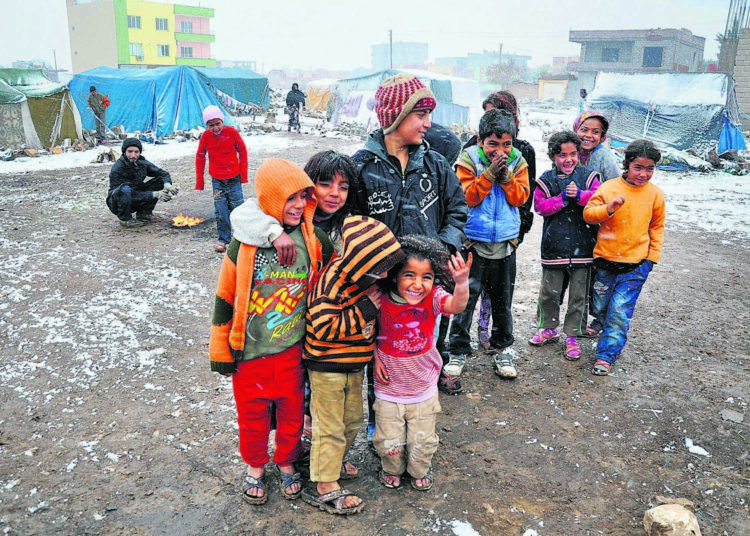Nordic Monitor
Turkey’s cowed opposition has jumped on the bandwagon of an Arab bashing frenzy pursued by President Recep Tayyip Erdoğan against the backdrop of the Arab League’s (AL) negative reaction to Turkey’s military incursion into northern Syria and growing resentment towards Syrian refugees among the Turkish population.
Ahmet Haluk Koç and Mehmet Güzelmansur, deputies for the main opposition Republican People’s Party (CHP); İsmail Özdemir of ultranationalist Nationalist Movement Party (MHP); and Ümit Özdağ of the right-wing nationalist Good (IYI) Party revealed how nationalism and hatred of Arab states have become common ground in Turkish politics during a meeting of parliament’s Foreign Affairs Commission on October 23, 2019. In their speeches the lawmakers noted the consensus of right and left-wing opposition parties on anti-Arab policies. Interestingly the commission meeting also exposed the staunch support of the opposition parties for President Erdoğan’s foreign policy priorities.
Following an emergency meeting called by Egypt on the incursion, the AL lambasted Turkey’s now paused operation as an “invasion of an Arab state’s land and an aggression on its sovereignty” and threatened Ankara with economic sanctions. However, President Erdoğan rejected the AL’s criticism of the Turkish operation, singling out in particular Egypt and Saudi Arabia.
The remarks were made by Turkish lawmakers in the commission meeting while they were discussing a draft bill on the Centre for Police Cooperation and Coordination (CPCC), which aims at improving police cooperation between member states of the Organisation of Islamic Cooperation (OIC).

Speaking at the meeting, Koç slammed the OIC and its Arab members over Turkey’s military operation in northern Syria and the history of Turkish-Arab relations. “Due to the opposition of OIC member states [Arab countries] to Operation Peace Spring [in northern Syria], [ratification of the statute] should be cancelled or withdrawn from the meeting agenda as a response and a practice of diplomatic reciprocity,” he said.
Koç accused Arab countries of betraying Turkey and the Ottoman Empire and of historically being hostile to both. “No good should be expected from any of these [Arabs]. No good has ever come from any of them either during the decline of the Ottoman Empire or in the history of Turkey…. With whom are we cooperating? The ones you try to cooperate with are out there. They are kingdoms, monarchies and redundant entities. They act in line with the desires of American imperialism. Those [Arab states] harbored hostility and betrayed both Turkey and its predecessor, the Ottoman Empire,” he stressed.
Praising Turkey’s foreign policy approach and its growing relations with the Turkic countries, Koç noted: “Turkey should be represented on OIC platforms but shouldn’t lead any OIC initiatives. … The correct attitude was to attend the meeting in Azerbaijan [7th Turkic Council Summit]. The true direction for Turkey — for the record — should be sharing a common destiny with the countries with which we share characteristics. If he is really sincere about it, the Turkish president should continue following the path observed in the Azerbaijan meeting.”
7th Summit of the Cooperation Council of the Turkic Speaking States (Turkic Council) was held in Baku on October 14-15, 2019 and attended by the heads of state of Azerbaijan, Kazakhstan, Kyrgyzstan, Uzbekistan, Turkey and Hungary. In his address at the summit President Erdoğan criticized the AL and noted the importance the council attaches to its cooperation and coordination with multilateral platforms. “We see that the role of structures such as the Turkic Council in global policy has been growing,” Erdoğan said.
In addition to Güzelmansur of the CHP, Özdağ of the IYI Party and Özdemir of the MHP voiced strong support for Koç and his party’s position. Additionally, Özdemir stressed that the foreign ministry would launch an Asia partnership program in the coming period and urged the ministry to include Turkic countries in that initiative.

Popular hatred against Arabs is not a new phenomenon in Turkey. In fact, textbooks teach Turkish children that the Arabs betrayed them during World War I. Nordic Monitor previously reported how the textbook, being used in all grades in Turkey’s government-run religious high schools known as imam-hatips, criticized established regimes in the Middle East and North Africa (MENA) region for preventing the ascension of Muslim Brotherhood movements to power, mentioned examples from Algeria, Tunisia and Egypt, and accused the rulers of these countries of not responding to or respecting the will of the people. The book states that the process of change is not over yet in some countries and praised the people for refusing to abandon their demands.
Prior to the AL condemnation, refugees from the Syrian civil war were fueling the anti-Arab hatred, with Syrian refugees becoming the main target for Turkish nationalist politics. For instance, Deputy Chairman of the IYI Party Özdağ has declared that Turkey is in danger of becoming “a Middle Eastern country.”
As a result of increasing racism, hundreds of Arabic-language shop signs and banners have been removed by the Turkish government. Turkish Interior Minister Süleyman Soylu announced that “offending” Arabic shop signs across Turkey would be changed within six months. “There is a standard, and that standard is Turkish. If they want to include small Arabic letters underneath, they can. Everyone will abide by the rules and obligations, whatever they are,” he said in July 2019.












